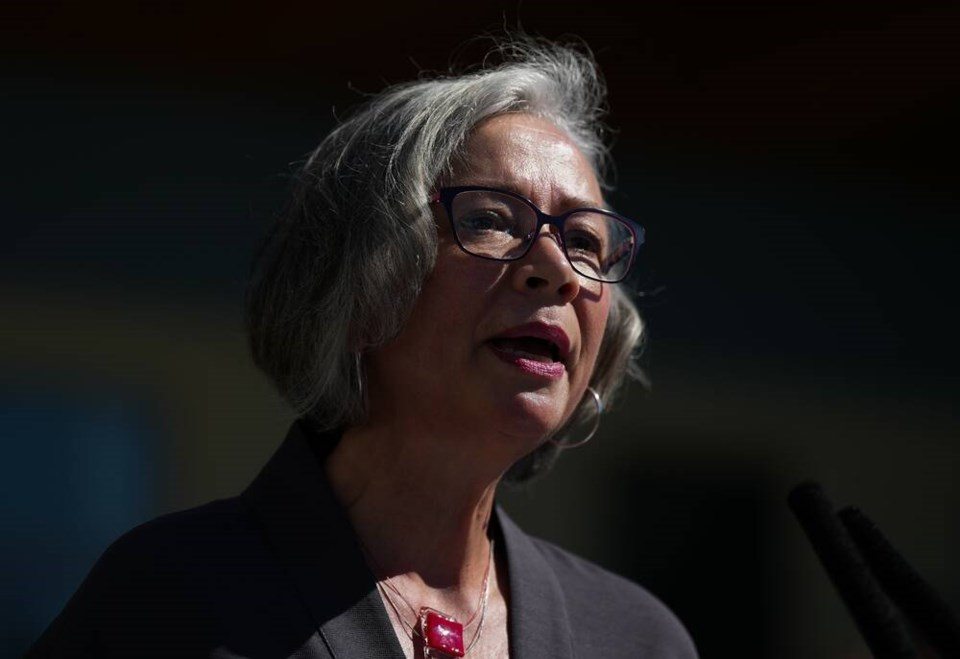Families with young kids in licensed child care in British Columbia will see their monthly fees drop automatically by up to $550 a month starting Dec. 1, says Education and Child Care Minister Jennifer Whiteside.
The fee reductions will mean families with children in kindergarten and younger in eligible care, or about 69,000 kids, will receive the lower fees, she said at a news conference Friday at a Burnaby elementary school that provides child-care services.
The savings for families are on top of earlier reductions of $350 per month for children under three years old in group care, which will cut fees by $900 a month, Whiteside said.
“We are moving towards our goal of $10-a-day child care for every family by reducing fees for parents and supporting providers,” she said.
The New Democrat government made $10-a-day child care an election promise and by Dec. 31 expected to have created 12,500 spaces at that rate, Whiteside said.
Cindy Allen, acting executive director of the Oaklands Community Association, which operates Little Acorn Care Centre in Fernwood, said the reduction in fees will certainly help. “This may be able to open up some doors for those who are of a lower economic status,” she said. But Allen wondered if the cost savings needed to be spread so widely. “I think that $10-a-day child care really is more beneficial to those who are making minimum wage, but those who are professionals, do they really need to have those savings?” she asked.
Allen said the fee reduction does little to tackle what may be a bigger problem — opening up child-care spaces.
She said it has been great to see school districts and the ministry coming together to build child-care centres, but it’s unclear who will staff them. “[Early childhood educators] are so darn hard to recruit these days,” she said, noting the government has been trying to help with wage enhancement and educational benefits.
Due to a lack of staff earlier this year, Little Acorn faced the prospect of cutting its child-care spaces in half to about 24 kids, until they managed to hire a new educator. Little Acorn also has a waitlist with hundreds of names on it, like many child-care centres around the region.
Katrina Chen, B.C.’s minister of state responsible for child care, said the fee-reduction program with its 96 per cent participation rate across the province is “a huge achievement.”
She thanked child-care providers who have partnered with the government, but could not immediately estimate the number of unlicensed daycare operations in B.C.
“When you think about $900 per month, per child, that is huge,” said Chen. “To all the parents, I want to tell you as a mother myself, we feel you. We feel you and understand that child care is critical for our economy, for our young children and for our families’ well-being.”
Karina Gould, the federal minister of families, child care and social development, said the federal-provincial partnerships on child care are a “nation-building endeavour” similar in transformation to the introduction of medicare in Canada.
“I like to talk about child care as a home run because it’s good for our kids,” she said. “It’s good for our families and it’s really good for our economy.”
Women most often feel the brunt of high child-care costs, and lower fees will help family finances and allow parents to pursue career and other opportunities, Gould said.
B.C. was the first province to sign on to the federal government’s $30-billion child-care plan and will receive $3.2 billion over five years.
Families in B.C. with children in kindergarten registered in before- and after-school care will see monthly reductions of $220 on top of earlier cuts of $100, said an Education Ministry statement.
The fee reductions will bring the average daily cost of child care in the province to $21 by the end of the year, down from the average of $53 before the government’s child-care initiatives began in 2018, said the ministry.



